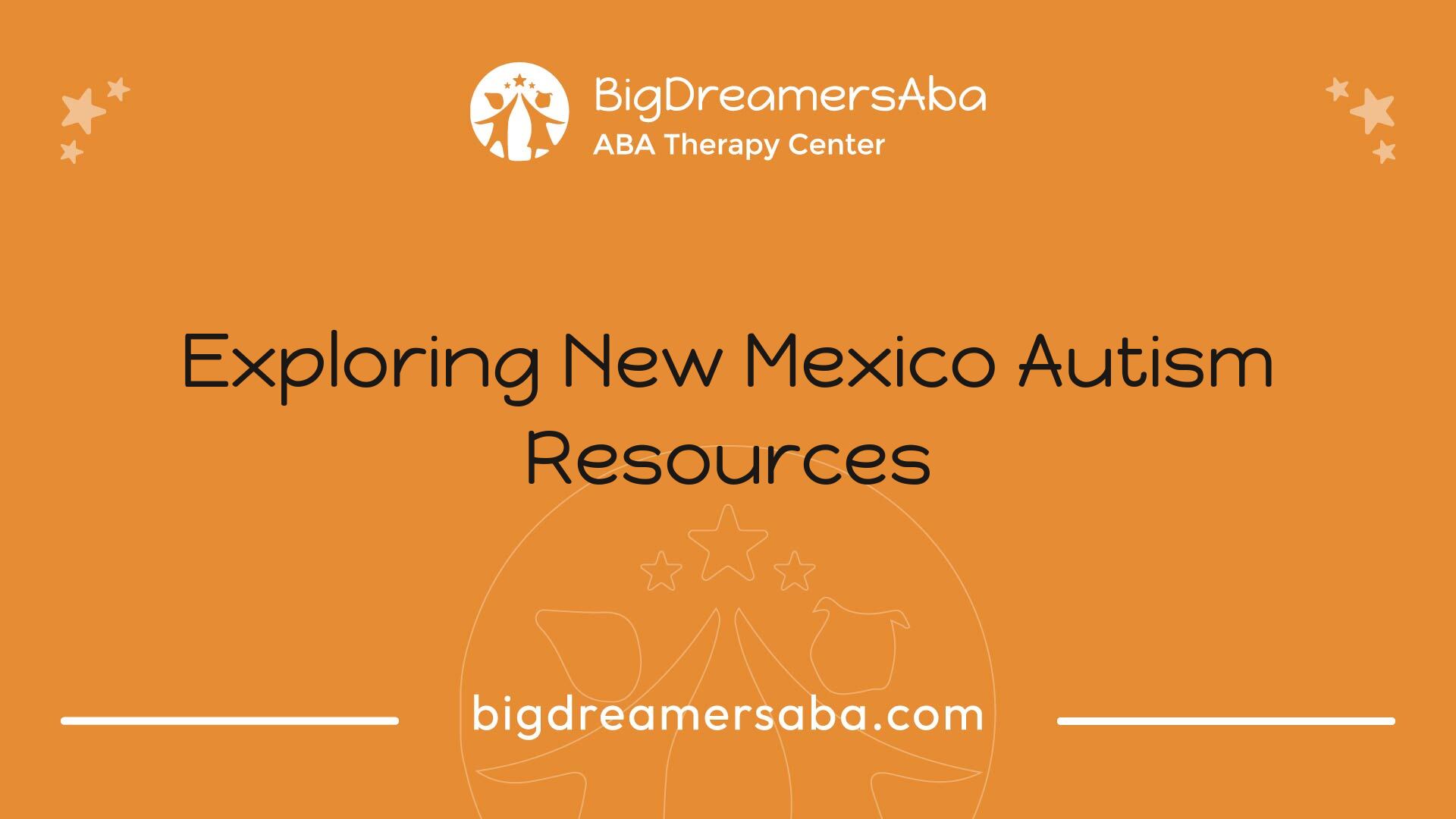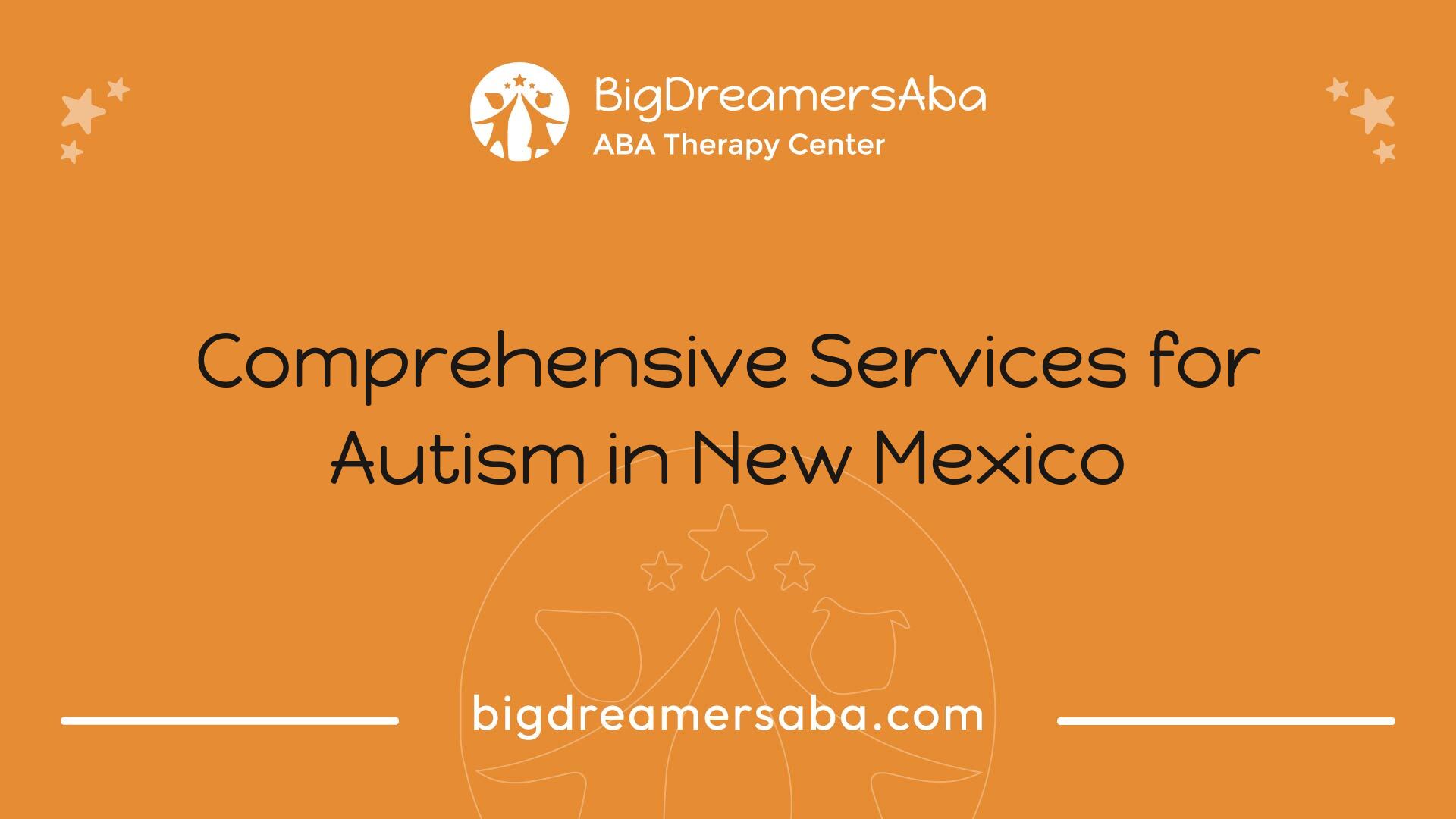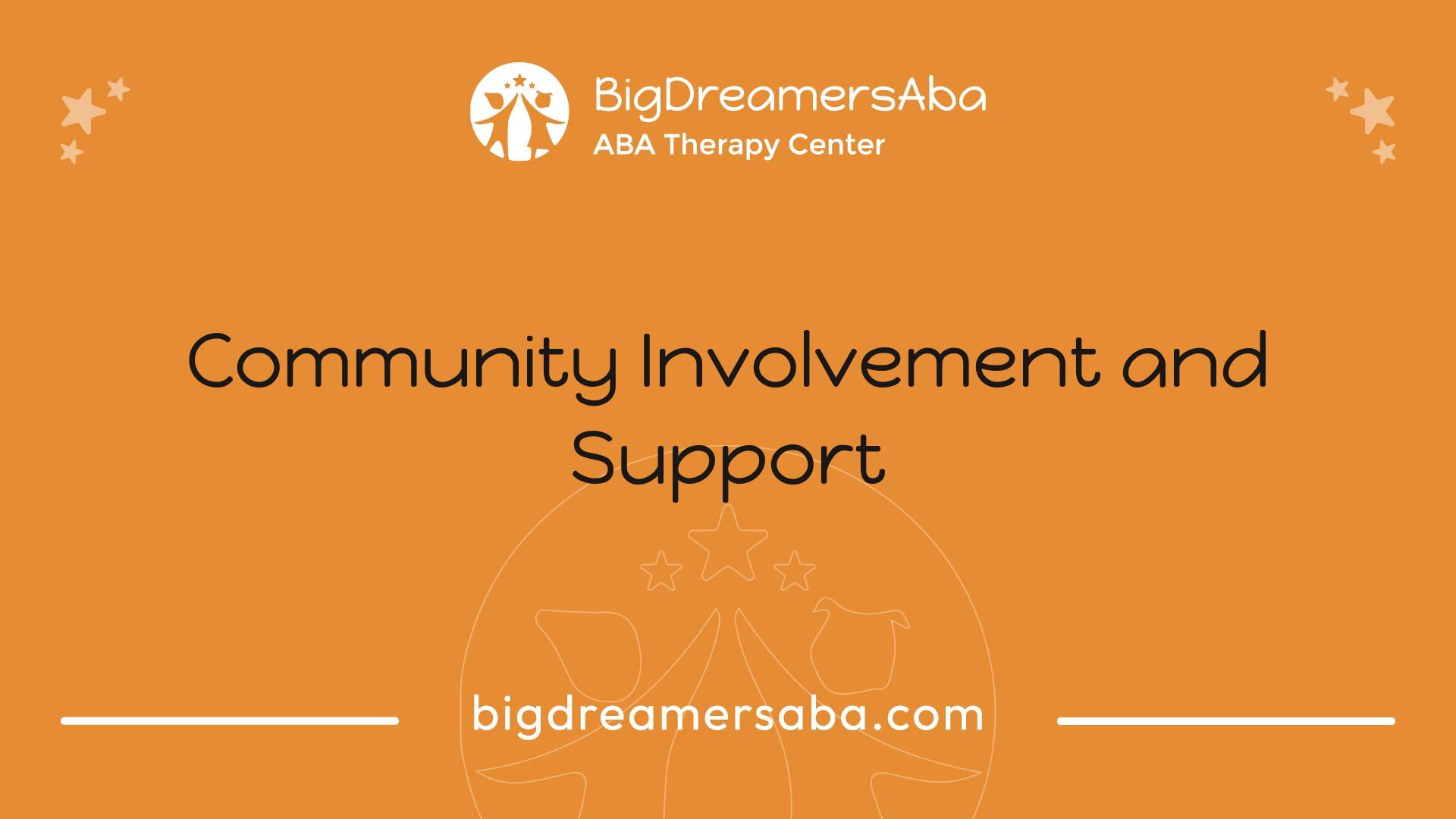Exploring New Mexico Autism Resources
Discover essential New Mexico autism resources for support, treatment, and community involvement for all.


Autism Support Resources in New Mexico
Navigating the world of autism resources in New Mexico can be overwhelming. However, several organizations and councils are dedicated to providing support and guidance to individuals and families within the autism community.
Autism Society New Mexico Overview
The Autism Society New Mexico serves as a vital affiliate of Autism Society America. Its mission is to create connections and empower everyone in the autism community by offering the necessary resources to live life fully. The organization provides a wide range of resources, including:
The Autism Society New Mexico focuses on improving the lives of individuals with autism and their families through educational workshops, support groups, and advocacy services. Their website is a comprehensive hub of information about local events and service providers, making it an invaluable resource for those in need.
Local Autism Councils and Resources
Individuals in New Mexico can explore local autism councils and committees for additional support. The state health agency also plays a crucial role in offering information about available resources and services [1].
One significant organization is the Autism Connection of New Mexico, a non-profit dedicated to providing resources and support for individuals with autism and their families. This organization hosts educational workshops, support groups, advocacy services, and maintains a directory of service providers. It also shares information about local events and activities, making it easier for families to connect with one another and find necessary services [2].
Resource ProviderServices OfferedAutism Society New MexicoEducational workshops, support groups, advocacy services, comprehensive resource directoryAutism Connection of New MexicoEducational workshops, support groups, advocacy services, directory of service providers
Knowing these resources, families seeking support for autism can feel empowered and informed about available options in New Mexico.
Comprehensive Services for Autism in New Mexico

Educational and Therapeutic Services
New Mexico offers a variety of educational and therapeutic services aimed at supporting individuals with autism. The New Mexico Autism Society provides resources across several categories, including private therapies, applied behavior analysis (ABA), counseling, education, equine therapy, and specialized schools [3].
This range of services ensures that families have access to essential support tailored to the unique needs of individuals with autism. For example, therapy centers and clinics across the state focus on delivering specialized care that promotes the development of social and communication skills.
Type of ServiceExamplesPrivate TherapiesSpeech therapy, occupational therapyEducational ProgramsSpecialized schools, learning resource centersRecreational ActivitiesEquine therapy, social skills groupsLegal ServicesAssistance navigating disability rights
In addition, workshops and training for parents and caregivers are available, equipping them with the necessary tools and information to support their children's development effectively. Various support groups foster community and shared experiences, allowing families to connect and share resources.
Accessibility and Well-Being Support
Accessibility to inclusive services is vital for the autism community in New Mexico. Ensuring that individuals with autism can thrive involves access to healthcare facilities, special education programs, and vocational resources [4].
The New Mexico Autism Society and other organizations work diligently to enhance awareness and understanding of autism within the region. By providing services like parent training, educational workshops, and access to specialized professionals, these organizations strive to improve life quality for individuals with autism and their families.
Support TypeDescriptionHealthcare AccessComprehensive medical care tailored for individuals with autismVocational SupportJob training programs and employment resourcesSpecial EducationPrograms specifically designed for students on the autism spectrumFamily SupportResources for emotional and practical assistance
This commitment to accessibility reflects a broader focus on community well-being, allowing families to feel supported and informed as they navigate the resources available to them. For more information on how these services are structured, additional details can be found in articles about autism laws and policies and educational resources for autism in New Mexico.
Community Involvement and Support

Community involvement plays a crucial role in providing effective support for individuals with autism and their families in New Mexico. Various organizations and support networks are dedicated to empowering families, fostering connections, and enhancing the quality of life for those affected by autism.
Role of the Autism Community
The autism community in New Mexico serves as a vital resource for sharing information, experiences, and support among families. Collective efforts help raise awareness about autism, leading to an increased understanding and acceptance within society. Engaging in community programs allows individuals with autism to develop social skills, create friendships, and participate in activities that promote their well-being. Support from the autism community also encourages advocacy efforts aimed at improving access to resources and services.
Support Organizations in New Mexico
Numerous organizations across New Mexico focus on autism support. Here are some key contributors:
OrganizationServices OfferedNew Mexico Autism SocietyEducational workshops, support groups, advocacy services, and information on local resources [2].Autism SpeaksAdvocacy, a searchable database of service providers, and grants for research efforts [2].New Mexico Department of HealthAccess to respite care, behavioral therapy, in-home services, and information on local support groups [2].Family Autism NetworkSupport, information, monthly meetings, and social events for families in Albuquerque.Autism Connection of New MexicoSupport services, educational workshops, advocacy, and a directory of service providers [2].
These organizations provide invaluable services and information that help families navigate the complexities associated with autism. They create an environment where individuals with autism can thrive while also supporting their families through various stages of development and life challenges.
Financial and Planning Resources
Accessing financial and planning resources can significantly ease the burdens faced by families dealing with autism. In New Mexico, several options are available to support individuals on the autism spectrum and their families.
Autism Financial Assistance
There are various financial assistance programs aimed at supporting families connected to autism. Local organizations and national initiatives offer grants and funding opportunities. These can include family grants intended to assist parents in managing the costs associated with autism treatment and care. Autism Speaks provides a comprehensive Resource Library that includes family grant opportunities and local funding programs categorized under advocacy, financial, and legal resources.
Additionally, the Autism Response Team (ART) can connect families with programs offering grants for specific needs, including technology aids, like iPads, which can be valuable in educational contexts. Families can reach out to ART for more information at 888-288-4762 or help@autismspeaks.org.
Financial Assistance Overview Table
Type of AssistanceDescriptionFamily GrantsFinancial aid to support autism-related treatment and care.Local GrantsRegion-specific financial opportunities to assist families.Technology GrantsSupport for purchasing assistive technology, such as iPads.
ABLE Accounts and Medicaid Waivers
Another crucial resource for families is the Achieving a Better Life Experience (ABLE) Act of 2014. This legislation allows families to open tax-advantaged savings accounts, known as ABLE Accounts, which enable them to save for long-term expenses without jeopardizing eligibility for public benefits like Medicaid and Supplemental Security Income (SSI). As of April 2016, over 40 states have implemented ABLE programs.
Equally important are Medicaid Waivers, which are available in most states and provide essential services to individuals with developmental disabilities. These waivers enable individuals to receive care and support within their communities rather than in institutional settings. Benefits may include coverage for medical treatments, respite care, transportation, and in-home support. Waiver programs may have varying eligibility criteria depending on the state, including specialized options like the "Katie Beckett waiver" or "Autism waiver".
Financial Planning Resources Table
Type of ResourcePurposeABLE AccountsTax-advantaged savings for long-term expenses without affecting public benefits eligibility.Medicaid WaiversServices for individuals with developmental disabilities in community settings.
Utilizing these financial and planning resources can empower families in New Mexico to provide necessary support and care for individuals with autism. By leveraging available grants, savings accounts, and Medicaid options, families can enhance their quality of life and access vital services effectively. For additional information, explore our resources on autism laws and policies.
Treatment Options in New Mexico
Exploring treatment options for autism in New Mexico reveals a variety of resources designed to support individuals with autism and their families. This section covers therapy centers and options, as well as the application of Applied Behavior Analysis (ABA) in practice.
Therapy Centers and Options
In New Mexico, there are several dedicated Autism Treatment Centers that offer various therapy options tailored for individuals with autism. These centers provide services that can address a range of behaviors and needs, contributing to individualized treatment plans. Common therapies include occupational therapy, speech therapy, and behavioral interventions.
Therapy CenterLocationServices OfferedABC AcademyAlbuquerqueApplied Behavior Analysis, Speech TherapyAutism Spectrum TherapySanta FeOccupational Therapy, Group TherapyNew Mexico Behavioral Health CenterLas CrucesIndividual Therapy, Family Support
Details regarding specific therapy centers may change over time. It is advisable to contact the centers directly for the most current information. For more insight into autism resources in other states, consider looking at New Jersey autism resources.
Applied Behavior Analysis (ABA) in Practice
Applied Behavior Analysis (ABA) is a widely recognized treatment approach for autism and its effectiveness has made it a significant option for families in New Mexico. ABA focuses on improving specific behaviors while also teaching new skills, utilizing techniques such as positive reinforcement and structured interventions.
Research indicates that ABA can address various skill areas including social skills, communication, and daily living skills, making it adaptable for individuals at different stages of development. Insights into the duration and intensity of ABA therapy can vary, but many programs suggest a commitment to multiple sessions each week for consistent growth.
Families considering ABA therapy should be aware of the importance of selecting qualified professionals who are well-versed in evidence-based practices. Individuals can find local providers and specialists through autism treatment centers or state resources that support clinical practices.
For more information on understanding autism and its various aspects, you may want to explore topics related to what is autism society of indiana? or the growing concerns about why is autism increasing?.
Cultural Considerations in Autism Support
An Indigenous Perspective
Understanding autism support in New Mexico requires a look into the unique experiences of Indigenous families, particularly the Diné, or Navajo Nation. An estimated 28.5 percent of individuals in Northern Arizona identify as Indigenous, with approximately 165,158 Diné individuals residing in the overlapping regions of Arizona, New Mexico, and Utah. Diné parents raising children with autism face specific challenges that impact their access to diagnostic and treatment services.
These challenges often include lengthy wait times for diagnostic services, sometimes extending for years. Limited training among clinicians and the need for cultural humility in service provision further complicate this landscape. Difficulties in scheduling appointments also present barriers, making timely access to care challenging for many families.
Factors Influencing Access to Services
Access to autism services for Diné families involves multiple factors. The diagnostic process is often described as emotionally taxing, which can deter families from seeking help. Specific elements that hinder access include:
BarrierDescriptionLong Wait TimesFamilies may face waits of up to several years for diagnostic services.Limited Clinician TrainingInsufficient training in culturally responsive care can impact service quality.Care CoordinationDifficulty in navigating care systems can delay access to needed services.Financial Aid for TravelMany families require support for travel costs to services that may not be locally available.Efficient Evaluation ProcessA streamlined diagnostic process can facilitate access, but inefficiency often exists.
Additionally, factors that help in accessing services for autism diagnosis include obtaining relevant referrals, coordinated care efforts, and financial assistance specifically for travel. Many parents have reported that a supportive social network and perceptions of service effectiveness play vital roles in their ability to seek and access appropriate treatment [7].
By understanding these cultural considerations and challenges, communities can better address the needs of Indigenous families and improve access to essential New Mexico autism resources.
Recent articles

How to Create a Structured Home Environment for Children with Autism

Why ABA Therapy Helps Children Build Confidence Through Skill Mastery
